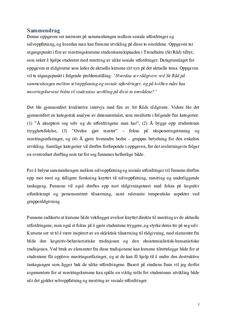| dc.description.abstract | Denne oppgaven ser nærmere på sammenhengen mellom sosiale utfordringer og selvoppfatning, og hvordan man kan fremme utvikling på disse to områdene. Oppgaven tar utgangspunkt i fire av mestringskursene studentsamskipnaden i Trondheim (Sit Råd) tilbyr, som søker å hjelpe studenter med mestring av ulike sosiale utfordringer. Datagrunnlaget for oppgaven er rådgiverne som leder de aktuelle kursene sitt syn på det aktuelle tema. Oppgaven vil ta utgangspunkt i følgende problemstilling: ”Hvordan ser rådgivere ved Sit Råd på sammenhengen mellom selvoppfatning og sosiale utfordringer, og på hvilken måte kan mestringskursene bidra til studentens utvikling på disse to områdene?”
Det ble gjennomført kvalitative intervju med fire av Sit Råds rådgivere. Videre ble det gjennomført en kategorisk analyse av datamaterialet, som resulterte i følgende fire kategorier: (1) ”Å akseptere seg selv og de utfordringene man har”, (2) Å bygge opp studentenes trygghetsfølelse, (3) ”Øvelse gjør mester” – fokus på eksponeringstrening og mestringserfaringer, og (4) Å gjøre hverandre bedre – gruppas betydning for den enkeltes utvikling. Samtlige kategorier vil drøftes fortløpende i oppgaven, før det avslutningsvis følger en overordnet drøfting som tar for seg funnenes helhetlige bilde.
For å belyse sammenhengen mellom selvoppfatning og sosiale utfordringer vil funnene drøftes opp mot teori og tidligere forskning knyttet til selvoppfatning, mestring og underliggende tankegang. Funnene vil også drøftes opp mot rådgivningsteori med fokus på kognitiv atferdsterapi og personsentrert tilnærming, samt relevante terapeutiske aspekter ved grupperådgivning.
Funnene indikerte at kursene både vektlegger øvelser knyttet direkte til mestring av de aktuelle utfordringene, men også et fokus på å gjøre studentene tryggere, og styrke deres tro på seg selv. Kursene ser ut til å være inspirert av en eklektisk tilnærming til rådgivning, med elementer fra både den kognitiv-behavioristiske tradisjonen og den eksistensialistisk-humanistiske tradisjonen. Ved bruk av elementer fra disse tradisjonene kan kursene tilrettelegge både for at studentene får oppleve mestringserfaringer, og at de kan få hjelp til å endre den destruktive tankegangen som ligger bak de ulike utfordringene. Basert på studiens funn vil jeg derfor argumentere for at mestringskursene kan spille en viktig rolle for studentenes utvikling både når det gjelder selvoppfatning og mestring av sosiale utfordringer.
Abstract
This paper will examine the coherence between social challenges and self-concept, and how development within these areas can be promoted. The paper is based on four mastering courses by the student welfare organization in Trondheim (Sit Råd). The courses’ purpose is helping students master different social challenges. The basis for the study is the counselors that lead the courses’ point of view. The following thesis have been chosen for this paper: “How do the counselors at Sit Råd view the coherence between self-concept and social challenges, and how can the mastering courses contribute to the students development within these areas?”
A qualitative interview of four of the counselors at Sit Råd was conducted. A thematic analysis resulted in the following four categories: (1) “To accept yourself and the challenges you have”, (2) To build up the students confidence, (3) “Practice makes perfect” – a focus on exposure training and mastery experiences, and (4) To make each other better – the groups significance for the individuals development. The categories will be discussed consecutively, before a superior discussion based on the comprehensive image of the findings will follow.
To highlight the coherence between self-concept and social challenges the studies’ findings will be discussed towards theory and previous research in relation to self-concept, mastering and underlying mindset. The findings will also be discussed based on counseling theory from cognitive behavioral therapy and a person-centered approach, along with relevant therapeutical aspects of group counseling.
The studies’ findings indicate that the courses focuses both on exercises directly related to mastering of the challenges in question, but also on making the students more confident. The courses seem to be inspired by an eclectic approach to counseling, with elements both from the cognitive-behavioral tradition and the existentialistic-humanistic tradition. By using elements from these counseling traditions, the courses can facilitate both for mastery experiences, and helping the students change the destructive mindsets that cause the different challenges. Based on the studies’ findings I will advocate that the courses may play a central role for the students’ development, both with self-concept and mastering social challenges. | nb_NO |
